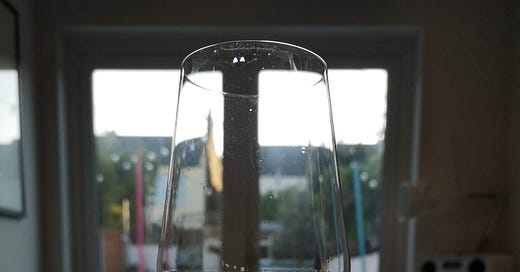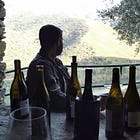Could Natural Wine Ever Be Appropriated by The Far Right?
Or: thoughts that keep me up at night
Whilst the sun dipped in the sky over a stunning vineyard, my husband and I sat down with a natural winemaker in Germany to discuss his winemaking philosophy.
We heard the usual. He doesn’t use synthetic chemicals in the vineyard. The juice ferments spontaneously. He doesn’t fine or filter his wines. In his case, doesn’t even use sulphites at any point in the winemaking process.
He has a spiritual nature to him—much of his winemaking is by feel and instinct. He’s interested in the cosmos and how that affects the wine he makes here on earth. He works biodynamically but doesn’t trust the certification bodies enough to become certified himself. He deeply cares about the environment and is determined to leave his land in a better state than he found it.
This was in 2015. At that time, you could, if you wanted to, call this winemaker “crunchy.”
Crunchy has historically been used to describe liberal, environmentally friendly views, like a strong belief in the virtue of eating whole, natural foods. Or when someone is anti-chemicals / anti-additives. You could think about chickens in the backyard and second-hand clothes for the kids.
Crunchy types are also often considered defiant and anti-mainstream. Which honestly sounds like many natural winemakers in a nutshell.
But this is no longer 2015. Now, we have the crunchy-to-alt-right pipeline. The idea that liberal rhetoric can become a gateway to alt-right politics.
The New York Times goes one step further and recently wrote that Crunchy is not only similar to the alt-right but has been claimed by them:
Since the election of Trump, #crunchy has evolved again, overlapping with #MAHA, or Make America Healthy Again: a politically right cry of health freedom and choice.
I am very interested in where natural wine sits within this political climate because alcohol content aside (I’ll get onto that), it’s perfect fodder for MAHA types. It’s considered healthy. No chemicals, few — if any — additives. It’s considered “clean” (a problematic word if ever I’ve heard one).
From what I have seen during my 12+ years in wine, natural wine has avoided the crunchy-to-alt-right pipeline, which is a relief. I have always been a strong advocate for natural wines and I do not want them to be wrapped up in that political agenda.
But I wonder: could natural wine be caught up in the far-right’s vision of health, food and wellness? And if it ever does, what does that mean for the movement?
Throughout writing this, I keep thinking “Is this too crazy a thought?”
But I can’t shake off what happened to raw milk.
Whilst raw milk has become the symbol of the alt-right in recent months, it never used to be. Quite the opposite, in fact. As politico.com says:
In the 2000s, there was never any question what slice of the political spectrum this organic food revolution (raw milk) belonged to: liberals, of course.
Anyone who has paid attention to food discourse in the last year or so will know this is no longer the case. Raw milk has become the epicentre of a food culture war. The darling of the alt-right. A movement in a bottle.
There are, of course, differences between natural wine and raw milk. Natural wine isn’t illegal, it’s not potentially dangerous to consume, and it’s more regulated. But there are similarities. Both have an anti-mainstream vibe. Both are manipulated products. Both claim health benefits.
Raw milk also fits very nicely into what conservative writer Rod Dreher put in his 2002 essay Crunchy Cons:
Conservatism is in part defined by the belief that “generally speaking, Small and Local and Particular and Old are better.
Small producers working with local products in a particular way that uses old methods.
That sounds like raw milk alright.
It also sounds like natural wine.
You can argue that natural wine is unlikely to go the same way as raw milk because it contains a big no-no — alcohol.
After all, Donald Trump doesn’t drink, neither does RFK-Jr. Democratic states tend to have more liberal liquor laws than Republican ones.
This, I would fathom, is one of the major reasons why natural wine hasn’t been appropriated. Alcohol is already a contentious subject with the Surgeon General keen to make it even more so with his suggestion of putting health warnings on alcohol labels:
There are two big buts here. First, despite sober leaders, America is still the world’s biggest wine consumer. People are still drinking it, even if not in the quantities they used to.
Second, America is not the only country in the world seeing a rise in far-right politics. Here in Europe, Portugal has Chega. France has the National Rally. Italy has Fratelli d'Italia. Germany has Alternative Für Deuschland.
All of these are winemaking countries where wine is widely drunk and drunk with less moral hand-wringing. You could even argue it’s practically considered your patriotic duty in countries like these to open a bottle of local wine.
To think that the far-right would never adopt natural wine because it contains alcohol is not looking at the wider world picture. These European political parties want votes. They want to change people’s values to reflect their own. If there is such a thin line between crunchies and the alt-right, appropriating natural wine could be a way to gain the support of another group.
The thought of which is enough to send this natural wine lover running to the hills.
My own journey with natural wine was certainly down the liberal side. Environmentalism was drummed into me from a young age and I was a bit of a green crusader. When I got into wine, it was the natural side that interested me the most. I thought the wines were more interesting, more energetic. I preferred hanging out with natural winemakers whose values I admired, rather than the suited marketing executives from big wineries who only cared about profits.
It stands to reason I would open a store and bar that specialised in natural and low-intervention wines. But we began in 2013 so we didn’t always shout about that side of it. Partly because a) we didn’t go in for the cloudy, funky stuff so many people associate (IMO, wrongly) with natural wine. And b) we lived in a conservative part of the UK, both socially and politically. I remember a customer once saying you could stick a Conservative Party ribbon on a turd in our town and people would still vote for it.
It was interesting to watch what happened to perceptions of natural wine during that time.
In the beginning, our wines were considered a bit too out-there for some of our more conservative clients. I remember a customer in the early years — someone very interested in wine — declaring that “all organic wines are made by hippies and taste like a farmyard.”
Then natural wine exploded in the UK and became every hipster’s go-to drink. Those who had moved from London to my small town an hour away would visit our store asking for orange wine. No added sulphites wine. “The funkier the better” wine. A blur of beards and tattoos, if I’m being honest (some stereotypes exist for a reason).
Then — and this is important — there were the healthy types. Those who didn’t want to go sober but were invested in what they were putting in their body. During the mid to late 2010s there was a slew of op-ed pieces on the health and environmental benefits of natural wine and a certain market evolved from there. Women (more often than not it was women) would come in asking for “wines that won’t give them a headache” or “wine that hasn’t got any additives.”
Wine became self-care. And whilst self-care isn’t inherently conservative or politically right-leaning it does dovetail into the wellness market. A market that is increasingly being appropriated by the far-right.
Or as the Guardian says in their article The dark side of wellness: the overlap between spiritual thinking and far-right conspiracies:
While the overlap of left-wing, magazine-friendly wellness and far-right conspiracy theories might initially sound surprising, the similarities in cultures, in ways of thinking – the questioning of authority, of alternative medicines, the distrust of institutions– are clear.
So is it completely crazy that a famous, wellness-obsessed Tradwife with strong right-wing political views could turn up on social media extolling the virtues of natural wine? If not in America then in Europe at least?
Stranger things have happened.
I would like to make some things very clear here. First, I do not mean to come across as a doom-monger. Natural wine has not been appropriated, I am merely wondering if it could.
Second, I do not think the natural wine movement itself is politically moving to the right. Whenever I’ve spoken to natural winemakers about their politics and value systems, I’ve found many of them to be on the liberal side of the spectrum (although of course, not always).
But if the far-right decides to try and funnel natural wine drinkers down that crunchy to alt-right pipeline, or choose to make it part of their culture war, we lot in the natural wine world must be prepared for how that might look.
All I can say is, let’s just hope it never, ever happens.
What do you think? Could natural wine ever be appropriated? Let me know in the comments (FYI I am on vacation this weekend 7th-9th Feb — I’ll dive into the comments section on my return).






so many thoughts.... When I covered food and beverages for Mother Nature Network for over a decade, it was the conservatives who wanted nothing to do with natural, organic, making sure kids got healthy foods. (I could write a whole chapter in a book about the comments I got whenever covering Michelle Obama's Let's Move and White House Garden).
"Crunchy" was an insult hurled at me. This new crunchy, conservative, religious mindset certainly was not something I would have predicted in the 2010s and while it's surprising, surprising and crazy things are happening so fast right now that no, it's not "completely crazy" to think that a "famous, wellness-obsessed Tradwife with strong right-wing political views could turn up on social media extolling the virtues of natural wine"
It really depends on the country. You mentioned Germany in 2015–a decade later, I think in this part of the world organic farming, raw milk, natural wine etc. is still overwhelmingly associated with Querdenken (“lateral” thinkers). Who are basically far left but have “unapproved” positions from the mainstream left, such as opposing war and supporting bodily autonomy. So I see it more as a matter of principles than a political movement. Maybe white nationalists started chugging raw milk but they don’t have a principled lifestyle with any of these other alternative components. Anyway wine is rightly or wrongly seen as an elite drink in much of the world. Not in Portugal where it’s part and parcel with daily life. But in the Anglosphere I don’t think rightists would adopt something so elitist.